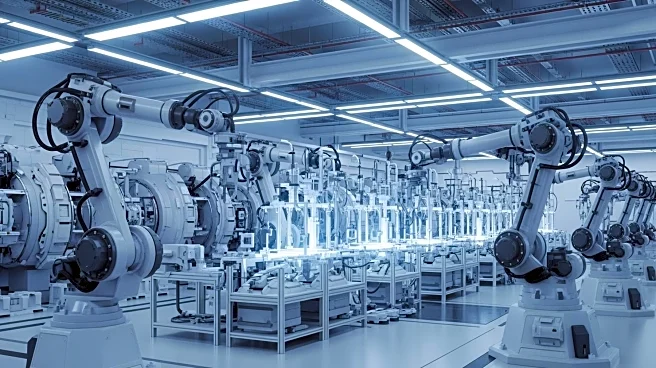What's Happening?
The concept of the Industrial AI Orchestra is transforming how complex, real-world problems are addressed in manufacturing. This approach involves a distributed ecosystem of AI agents working collaboratively, rather than relying on a single, all-knowing
AI model. The system is composed of various types of agents, including simple scouts, specialist players, and orchestrator conductors, each playing a unique role in data collection, analysis, and workflow management. The orchestration of these agents allows for efficient problem-solving, as demonstrated in a case study involving a throughput drop on a packaging line. The orchestrator agent coordinates the efforts of edge and cloud-based agents to diagnose and resolve the issue, showcasing the potential of this collaborative AI model.
Why It's Important?
The Industrial AI Orchestra represents a significant shift in the application of AI within the manufacturing sector. By leveraging a network of specialized agents, companies can achieve more resilient, scalable, and efficient operations. This approach not only enhances problem-solving capabilities but also supports the integration of AI into existing industrial processes. The orchestration of AI agents can lead to improved productivity, reduced downtime, and optimized resource management, offering substantial benefits to manufacturers. As industries increasingly adopt AI technologies, the collaborative model proposed by the Industrial AI Orchestra could become a standard, driving innovation and competitiveness in the sector.
What's Next?
The successful implementation of the Industrial AI Orchestra depends on the development of standardized communication protocols, such as Agent-to-Agent (A2A) communication and Model-Context Protocol (MCP). These protocols are essential for ensuring seamless interaction between agents from different vendors and hardware platforms. As these standards evolve, they will facilitate the widespread adoption of the orchestration model, enabling more industries to benefit from its advantages. Future developments may focus on enhancing the interoperability and scalability of AI agents, further solidifying the role of the Industrial AI Orchestra in transforming manufacturing processes.
Beyond the Headlines
The orchestration model of AI agents raises important considerations regarding data privacy, security, and ethical use of AI in industrial settings. As agents collect and analyze vast amounts of data, companies must ensure compliance with data protection regulations and ethical standards. Additionally, the reliance on AI for decision-making processes necessitates transparency and accountability to prevent biases and errors. The long-term impact of the Industrial AI Orchestra may also include shifts in workforce dynamics, as automation and AI integration redefine roles and responsibilities within manufacturing environments.

















